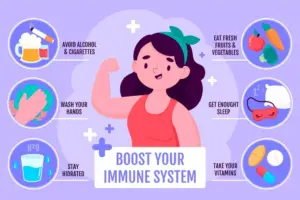Hypertension (High Blood Pressure) – Symptoms, Causes, and Treatment
High blood pressure, medically known as hypertension, is a condition where the force of blood against the walls of the arteries is consistently too high. Blood pressure is measured in millimetres of mercury (mmHg) and consists of two values: systolic pressure (the force when the heart pumps) and diastolic pressure (the force when the heart rests between beats). A normal reading is around 120/80 mmHg, but when it consistently exceeds 140/90 mmHg, it is classified as hypertension.
Hypertension is often called a “silent killer” because it usually has no noticeable symptoms but significantly increases the risk of heart disease, stroke, and kidney problems. Regular monitoring of blood pressure is crucial for early detection and prevention of complications.
What Causes High Blood Pressure? (Primary & Secondary Hypertension)
Primary Hypertension
Primary hypertension is the most common type and develops gradually over time due to a combination of genetic and lifestyle factors. It typically affects individuals as they age and is strongly linked to lifestyle choices.
Secondary Hypertension
This type results from an underlying health condition or certain medications. It tends to appear suddenly and can lead to higher blood pressure readings than primary hypertension.
Key Causes of High Blood Pressure
- Unhealthy Diet: High intake of salt, saturated fats, and cholesterol can lead to hypertension.
- Lack of Physical Activity: A sedentary lifestyle contributes to weight gain and poor circulation, raising blood pressure.
- Obesity and Stress: Excess weight puts additional strain on the heart, while chronic stress triggers hormonal responses that can increase blood pressure.
- Smoking and Excessive Alcohol: Nicotine and excessive alcohol consumption can damage blood vessels and elevate blood pressure levels.
- Chronic Conditions: Kidney disease, diabetes, and sleep apnea are common medical conditions that can cause or worsen hypertension.
- Sudden Hypertension: Acute stress or certain medications (such as pain relievers, decongestants, and birth control pills) can lead to temporary spikes in blood pressure.
Symptoms of High Blood Pressure
Hypertension is often asymptomatic, making regular blood pressure checks essential. However, in severe cases, individuals may experience:
- Persistent headaches
- Dizziness or lightheadedness
- Blurred vision
- Nosebleeds
- Chest pain or shortness of breath (in extreme cases)
Because symptoms only appear when blood pressure reaches dangerously high levels, routine monitoring is the best way to detect and manage hypertension early.
High Blood Pressure Treatment Options
Lifestyle Changes (First-Line Hypertension Treatments)
Many cases of hypertension can be managed through lifestyle modifications, including:
- Heart-Healthy Diet: Eating a balanced diet rich in fruits, vegetables, whole grains, and lean proteins while reducing sodium and unhealthy fats.
- Regular Exercise: Engaging in at least 150 minutes of moderate-intensity exercise per week can help lower blood pressure.
- Weight Management: Losing excess weight can significantly reduce hypertension risk.
- Reducing Alcohol and Quitting Smoking: Limiting alcohol intake and stopping smoking can improve heart health and lower blood pressure.
- Stress Management: Practices like meditation, yoga, and deep breathing exercises can help control stress-induced blood pressure spikes.
Medications for High Blood Pressure Treatment
When lifestyle changes are insufficient, medications may be prescribed, including:
- Diuretics: Help remove excess sodium and fluid from the body.
- ACE Inhibitors: Relax blood vessels and lower pressure.
- Beta-Blockers: Reduce heart rate and workload on the heart.
- Calcium Channel Blockers: Prevent calcium from entering heart cells, helping arteries relax.
- Combination Therapies: Some individuals require multiple medications to manage their condition effectively.
Hypertension Holistic Treatment
Alternative treatments can complement conventional medicine, including:
- Natural Remedies: Garlic, hibiscus tea, and omega-3 supplements have shown potential in lowering blood pressure.
- Acupuncture and Biofeedback Therapy: These techniques may help some individuals regulate their stress response and improve circulation.
High Blood Pressure Hospital Treatment
In cases of hypertensive crises (blood pressure exceeding 180/120 mmHg), immediate medical intervention is required. Emergency treatments include:
- IV medications to rapidly lower blood pressure
- Continuous monitoring in a hospital setting to prevent complications
High Blood Pressure Treatment in London
London offers a range of healthcare services for managing hypertension, including NHS and private clinics. Specialists, including cardiologists and hypertension experts, provide personalised treatment plans based on individual needs. Many clinics also offer advanced diagnostic tools, lifestyle counselling, and medication management to ensure effective blood pressure control.
Preventing High Blood Pressure
While some risk factors (such as genetics) cannot be changed, many lifestyle choices can significantly lower hypertension risk:
- Regular Health Screenings: Early detection helps prevent complications.
- Balanced Diet and Active Lifestyle: A nutritious diet and regular physical activity can maintain healthy blood pressure.
- Managing Stress and Avoiding Tobacco: Stress reduction techniques and quitting smoking are crucial for long-term cardiovascular health.
Conclusion
Hypertension is a serious but manageable condition. Understanding its causes, symptoms, and treatment options can help individuals take proactive steps toward better heart health. Whether through lifestyle changes, medication, or alternative therapies, managing blood pressure effectively is essential for overall well-being.
If you are concerned about high blood pressure, consider booking an appointment with a specialist to assess your condition and develop a tailored treatment plan.



